Does the Economy Determine our Happiness?
The world happiness report has been released for 2015, ranking countries as the name suggests, in order of happiness. The report looks at a number of issues in order to determine the overall well-being of a nations people. This year’s top countries featured many you would expect, with Scandinavian nations coming out on top, and Australia and New Zealand making the top ten once again.
- Switzerland (7.587)
- Iceland (7.561)
- Denmark (7.527)
- Norway (7.522)
- Canada (7.427)
- Finland (7.406)
- Netherlands (7.378)
- Sweden (7.364)
- New Zealand (7.286)
- Australia (7.284)
We hear a lot about how important the economy is, but is it the key to a happier nation? The world happiness report lists a number of reasons for a country’s happiness. Gross Domestic Product (GDP) is just one of eight criteria, which also includes generosity. It is obvious that it is not all about GDP, but how much of a difference does it make?
One way of testing is to compare the World Happiness Report with the Social Progress Index (SPI) rankings, which measures a country’s success not by economic growth but by assessing their ability to “address basic human needs, equip citizens to improve their quality of life, protect the environment, and provide opportunity for many of its citizens is not succeeding.”
This SPI is measuring many of the same things that the World Happiness report is, with the exception of GDP. If you compare the two you will find that GDP is perhaps one of the smaller influences of nation happiness.
If you look at the happiest countries and then look at their ranking on the social progress index you can see there is a strong correlation.
| World Happiness Ranking | Social Progress Index Ranking | |
| Switzerland | 1 | 3 |
| Iceland | 2 | 4 |
| Denmark | 3 | 8 |
| Norway | 4 | 1 |
| Canada | 5 | 6 |
| Finland | 6 | 7 |
| Netherlands | 7 | 9 |
| Sweden | 8 | 2 |
| New Zealand | 9 | 5 |
| Australia | 10 | 10 |
*Data collected from World Happiness Report, 2015 and the Social Progress Imperative.
What makes this even more interesting is that when you also compare these lists and cross-reference them with GDP per capita you get some results that you might not expect.
| World Happiness Ranking | Social Progress Index Ranking | GDP Per Capita Ranking | |
| Switzerland | 1 | 3 | 8 |
| Iceland | 2 | 4 | 21 |
| Denmark | 3 | 8 | 18 |
| Norway | 4 | 1 | 6 |
| Canada | 5 | 6 | 20 |
| Finland | 6 | 7 | 23 |
| Netherlands | 7 | 9 | 11 |
| Sweden | 8 | 2 | 15 |
| New Zealand | 9 | 5 | 28 |
| Australia | 10 | 10 | 19 |
*GDP data collected from the United Nations World Bank – 2013 data
From here you can see that in the first two reports all countries performed extremely well, but when it comes to GDP per capita you can see this is not always the case. From the table you can see that only Norway and Switzerland appear in the top ten for all three.
This is even more surprising when you consider other countries with a good GDP per capita. Ireland comes in at number 12, and Bahrain beats Australia at 17th. This suggests that while GDP is a factor in lowering the happiness of a nation it can not be the focus. If you look at the three best performers in terms of GDP, Qatar, Luxembourg, and Kuwait, you can see they are not considered to be among the happiest nations in the world.
| World Happiness Ranking | Social Progress Index | |
| Qatar (1) | 28 | Unranked |
| Luxembourg (2) | 17 | unranked |
| Kuwait (3) | 39 | 47 |
*Data collected from World Happiness Report, 2015 and the Social Progress Imperative.
This information might seem unsurprising, but in Australia during the 2013 election the economy was considered the most important policy issue, miles ahead of asylum seekers, health and education and climate change. The ABC’s ‘vote compass’ polled 250,000 people and found that for 28% of the Australian population the economy was the most important issue, but in reality the economy is not the biggest contributor to our happiness.

It is time that we started thinking about more than just the economy. It is time that we started thinking about the social implications of our decision and stop defining success as good economic growth. Social progress may stunt economy growth, but that doesn’t necessarily mean we will be less happy.



Be the first to comment!